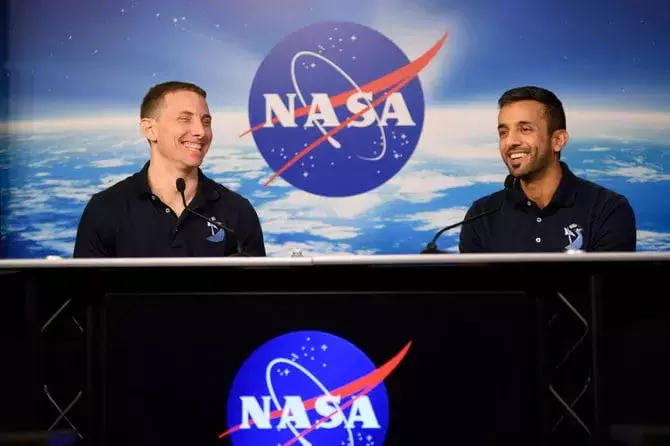
Fasting during Ramadan not necessary on ISS: UAE astronaut
text_fieldsHouston, Texas: On his upcoming space trip, Emirati astronaut Sultan Al-Neyadi said on Wednesday that he won't be required to fast during Ramadan.
When the 41-year-old launches for the International Space Station (ISS) the next month aboard a SpaceX Falcon 9 rocket, he will make history as the first Arab astronaut to spend six months in space.
On February 26, Neyadi, NASA astronauts Warren Hoburg and Stephen Bowen, as well as Andrey Fedyaev of Russia, will go to the International Space Station as members of the SpaceX Dragon Crew-6.
Neyadi responded that his circumstance qualifies as an exception when asked how he plans to observe the holy month of Ramadan when Muslims generally fast from dawn till sunset.
“I’m in... the definition of a traveler, and we can actually break fast,” Neyadi said. “It’s not compulsory.”
“Actually fasting is not compulsory if you’re... feeling not well,” he said.
“So in that regard, anything that can jeopardize the mission, or maybe put the crew members in a risk, we’re actually allowed to eat sufficient food.”
Neyadi will be the second citizen of the oil-rich United Arab Emirates to travel to space, AFP reported.
Hazzaa Al-Mansoori spent eight days on the International Space Station in September 2019.
At the Johnson Space Center on Wednesday, the NASA astronauts and Russian cosmonaut were also questioned about if any of the political tensions on Earth, such as those surrounding Ukraine, crossed over into space.
“I’ve been working and training with cosmonauts for over 20 years now and it’s always been amazing,” said NASA’s Bowen, a veteran of three space shuttle missions.
“Once you get to space, it’s just one crew, one vehicle and we all have the same goal.”
Fedyaev pointed to the “very long history” of space cooperation between Russia and the United States.
“The life of people in space on the International Space Station is really setting a very good example for how people should be living on Earth,” the Russian cosmonaut said.
NASA representatives predicted a five-day handover between the four members of Dragon Crew-5, who have been on the ISS since October, and the members of SpaceX Dragon Crew-6.
Three astronauts, who had their return vehicle Soyuz crew capsule damaged by a minor meteoroid strike in December, are also now aboard the ISS.
To bring back the trio—Russian cosmonauts Dmitry Petelin and Sergei Prokopyev and NASA astronaut Frank Rubio—to Earth, Russia intends to launch an empty spacecraft to the International Space Station (ISS) on February 20.
After the meteoroid collision, their Soyuz MS-22 crew capsule developed a radiator coolant leak.
In September, MS-22 carried Petelin, Prokopyev, and Rubio to the International Space Station after taking off from Kazakhstan's Baikonur Cosmodrome, which is operated by Russia.
It has been decided to extend their stay on the ISS by several more months. Originally, they were supposed to return to Earth in the same spacecraft in March.
Since the 1960s, Russia has launched humans into space using the ageing but reliable Soyuz spacecraft.
Since the beginning of the Russian war in Ukraine, space has remained a rare area of collaboration between Moscow and Washington.
Following the Cold War "Space Race," US-Russian cooperation increased at the time of the ISS launch in 1998.





